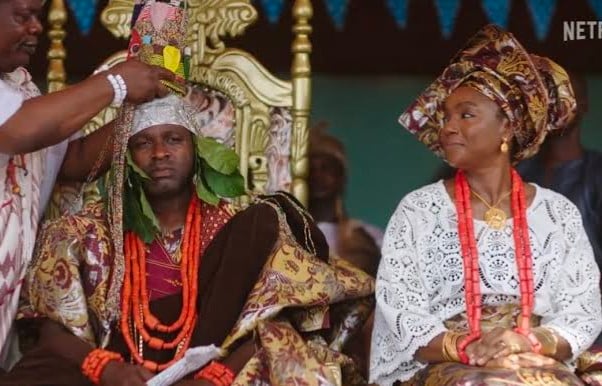Femi Adebayo’s directorial debut ‘Seven Doors‘ premiered on Netflix on December 13, and it’s clear that this six-part miniseries is a game-changer.
Adebayo, already known for his work on ‘Agesinkole’ and ‘Jagun Jagun’, cements his reputation as a filmmaker who consistently delivers compelling stories.
SYNOPSIS
‘Seven Doors’ tells the story of King Adedunjoye, a man whose reign is troubled by familial struggles, the traditions of his time, and the burden of leadership. This gripping narrative explores themes of love, betrayal, desperation, greed, cultural unity, and the power of traditions.
THE STRONG POINT OF THE SERIES
One of the standout features of ‘Seven Doors’ is its plot and narrative style. The storyline feels distinct and refreshing, standing out from the typical films about kings or their trials. The narrative takes a different approach, delivering an unpredictable story filled with engaging plot twists.
Despite the back stories that needed to be conveyed to the new king and several subplots, the story remains straightforward and easy to follow. The seamless progression of the plot, combined with skillfully interwoven subplots, culminates in a cohesive conclusion.
The costume and set design are absolutely stunning, leaving me in awe throughout the series. The clothes and jewelry worn by the king, chiefs, queens, and Prince Adeeyo radiate luxury, perfectly capturing the opulence of the 1900s. Did you notice the vintage cars and their license plates as well? The attention to detail is nothing short of impressive. Beyond the costumes, the houses chosen for the film beautifully reflect the era. From the plates to the curtains and chairs, every element was thoughtfully curated. I even spotted the old Fanta bottle! It is evident that extensive research went into every aspect of the production, resulting in a masterful level of detail that elevates the entire production.
The entire cast of ‘Seven Doors’ brought their roles to life with remarkable authenticity. They didn’t just act — they became their characters, delivering dialogue and emotions so naturally that it felt real. The emotional depth they brought to their roles was impressive, particularly in the intense scenes. One standout moment was when one of the priest’s wives discovered her daughter had died — a deeply emotional performance from one of the minor actors in the series. In that scene, the actress delivered flawlessly. Similarly, Otun’s wife mourning her daughter was heart-wrenching; you could feel her pain. The chiefs, the king, Queen Amaka, Adeeyo, and especially Esusu stood out. Esusu’s performance was so convincing you’d almost believe he had once been a deity himself, given how perfectly he embodied the role. From the major characters to the minor ones, every actor fits seamlessly into the story. Not a single cast felt out of place.
Also noteworthy in the series is its exploration of relatable themes. From love, betrayal, desperation, and greed to cultural unity and the power of traditions, the themes are thoughtfully depicted. For me, the theme of cultural unity resonated with me the most.
Beyond the inter-cultural marriage between the king and Queen Amaka, it was even more striking in the scene where the Igbo herbalists came to support the king in his battle against Esusu. That moment underscored the importance and strength of unity, and the benefits of embracing diversity regardless of cultural differences.
‘Seven Doors’ delivers impressively in its cinematography, with every element thoughtfully executed. The lighting, camera angles, framing, and resolution are noteworthy.
THE WEAK POINT OF THE SERIES
While ‘Seven Doors’ is an exceptional production, there are a few areas where it falls short. The visual effects are a bit of a mixed bag, with some well-executed while others feel less realistic.
For instance, the depiction of the dead bodies from the timber incident could have been more realistic. Similarly, the attempt to age Kolawole Ajeyemi didn’t quite hit the mark; it felt overdone and unnatural. The closing scene, where rain was supposed to fall was also unconvincing.
Another noticeable flaw in the series is the lack of character development for Prince Adeeyo. While we know he is a prince vying for the throne, his character lacks depth and context. Questions about his background are left unanswered; like where his family is. Is he the only prince in his family eligible for the throne? What does he do for a living, and how did he accumulate wealth? Also, his storyline ends abruptly after Opayemi becomes crippled following his failed mission against the king. What happened to Adeeyo afterward? Did he flee? Did he face any consequences? The lack of closure makes his role incomplete. While it’s understandable that this is a series and a sequel could address these gaps, a more conclusive ending for Adeeyo in this installment would have been better.
Finally, the story feels rushed close to the concluding part, with some plot threads left unresolved.
FINAL VERDICT
‘SEVEN DOORS’ GETS 8/10
Copyright 2025 TheCable. All rights reserved. This material, and other digital content on this website, may not be reproduced, published, broadcast, rewritten or redistributed in whole or in part without prior express written permission from TheCable.
Follow us on twitter @Thecablestyle

